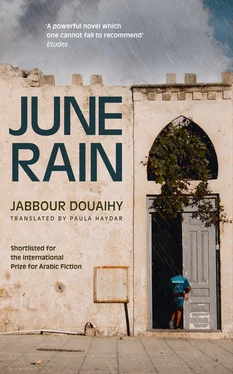They woke up to their names in the 1940s, specifically the mid-1940s, and so they went for a second time to the government palace, to the Court Magistrate, with a petition in hand requesting correction to what they said was mistakenly left out of the record of their names. The Magistrate got so sick and tired of them that he asked the court herald, who had only one eye, to go around the neighbourhood, stop at every intersection, and announce in a loud voice that name-change cases would only be considered once a week, on Tuesdays. They were familiar with the process, to the point that they didn’t need to hire a lawyer, because they could present the request and bring two witnesses and answer a few questions. The census clerk and the coffee vendor out in front of the government palace stood as witnesses for everyone. The Magistrate became furious, wondering aloud, right in front of his clerk, what had come upon them all of a sudden to wake up to family relations that for generations had been of little value except for dividing up lands and inheritance and all the bickering that went along with it.
The employees at the Department of Personal Records kept going back over and over the registration books, opening them so many times to correct names or add surnames or remove the names of the dead or of women who had married and moved to other towns or to register new births that the edges of the huge books became frayed and some of the pages were torn and had to be pasted back together with difficulty. The people’s very existence had become threatened, because a number of pages were nearly torn out or erased, nearly causing many names to be lost.
Nowadays they are able to quench their thirst for numbers — numbers of voters in their family, that is, because they can request a CD from the Ministry of Interior, something that has saved their rosters from dwindling away. This way they are able to get an exact count of their relatives according to how their names appear on the official ledger, and they regret that those of them who emigrated to faraway lands like South America and Australia didn’t bother to register their children, otherwise their numbers would be doubled. Likewise, they are able nowadays to surf the web and Google their family names, sometimes finding people with the same family name or the same first name in the Bahraini House of Notables or on the Moroccan national football team. Some youngsters who were electronics fanatics and web experts constructed websites for their families on the internet, like ‘Semaani.com’, for example, for which they also designed a family emblem with a sword, a book and the sceptre of their religious authority. They recorded on the website all the family births at home and abroad, as well as their marriages and deaths, and they also exchanged email addresses and posted news about the family notables and constantly reminded visitors of the luminaries among them — a historian, for example, who wrote about the eternalness of the Lebanese mountain and for whom General de Gaulle wrote an introduction to his collected works, or an artist who travelled to distant lands but made the scenery of his childhood and its colours the subject of his first and only paintings — all of this to make their families seem vast and rich and extended. They bragged that their family included everything from a highly reputed neurosurgeon in California to a judge running for mayor of Mexico City and a centre player for the Australian national rugby team.
Behind every family there was someone responsible for family reunions, a notable or rich man who began forging friendly relations in the capital with Monsieur Plafond, one of the aides to the French High Commissioner, or with one of the employees of the British delegation. He got promises of support from them and returned to the town at the end of the week in order to add to his family, which had just woken up to itself, as many well-known relatives as he could, along with neighbours who had earned the right to carry the family name, or the ones from small families who added their wives’ families to their own. And the family had its zaeem and its candidate for a seat in Parliament, who imitated the noble family’s descendents by seeking to build a Lebanese-style home, as they called it, and by making sure he didn’t take a wife from within the town.
When they woke up to their names and families like that, they assumed that they were eternal. This is why they were surprised by what a young historian who visited Istanbul at his own expense told them. He checked the Tabo Daftari, the Ottoman public records going back to the sixteenth century when they were released to the public by the Turkish Ministry of Culture, and found out that their ancestors carried simple names — the man’s name and his father’s name. Rizq bin Jirjis, or even simply, Ishaac bin Ibrahim. They didn’t care to hear what he had to say about the number of threshing floors they owned, or olive presses, cattle, fruit trees, or about the taxes their ancestors paid at times to the Wali of Damascus and at other times to the Wali of Tripoli, or how they had been hardy farmers who cultivated the rugged land, suffered persecution, and produced pure and pious men of religion, bishops and patriarchs who expounded on their beliefs and established them in rare writings and in numerous languages, monks who brought the first printing press to the East and founded in their town the first school in this mountain of knowledge and holiness. All of this did not elicit the slightest bit of interest. All that mattered was the shock of finding out that their names, the names of their families, which when arguments flared up they said they paid for in blood, did not even exist in those days and that perhaps they themselves had invented the families in the era of democratic pluralism.
The family was divided into branches, and each one of these they called a jibb , or a well. Each jibb had its characteristics, as for example the men of such-and-such jibb usually died of congenital heart failure, or those of this other jibb always over salted their food, and still others were known to be cowards who put on their pyjamas at sunset, or didn’t pay what they owed because their grandfather told them not to. They spun yarns about heroic deeds and every family had its tough guys, those with the frowns on their faces for no reason. Their fame and talk of their heroic deeds spread far and wide. Every one of them earned a title he bragged about. They started counting their ‘rifles’, in whispers, whereas before they had divided up into families they had had tough men among them who were not part of the big families’ lineage. They shared the memory of those men and held them up as examples, as in the case of Butros Touma, who had attacked the enemies carrying a cannon on his shoulder, or Al-Ghazaal and Al-Aaouri, who had both been shot high up in the mountains by Turkish soldiers after their own guns ran out of ammunition. And there was Sarkis Naoum who had supplied wheat free of charge during the Great Famine and the siege on Mount Lebanon during the Great War, and who had been shot in the back.
All of them stood to receive condolences whenever any member of their extensive family died, and relatives of theirs who strayed from them they called a communist or a mason. They couldn’t understand how anyone would disown his own family. Blood ties, after all, exerted obligatory pressure even on those who did not have much to offer. They hesitated over taking a wife from outside the family and some were wary of dangers the future might hold, so they rented or bought themselves houses close to where their relatives lived. They preferred to buy their daily needs and provisions from their cousins’ shops, even if they were a long distance from their homes. But if they happened upon members of other families — even the especially competitive and cut-throat ones — when they were in Beirut or anywhere outside their town, they always hastened to greet them wholeheartedly, offering their services with insistence. For the most part, they were sincere about the concern they showed for each other. They brought their familial divisions with them to Sydney, Caracas and Mexico, where they didn’t dare to resort to violence to settle accounts, but were content to hold meetings in which they backed each other up and offered aid to their relatives in the homeland, which did not extend beyond infusing the family coffers with dollars they were able to save up by the sweat of their brows. They dug up proverbs such as ‘He who takes off his clothes gets cold’ and ‘Blood is thicker than water.’ They brandished these proverbs in the face of those they felt were either hesitant or doubtful about their life’s journey, and they complained that none of the other families loved them. They felt they were being naïve, going out of their way for others without getting anything in return except perhaps some ingratitude.
Читать дальше












